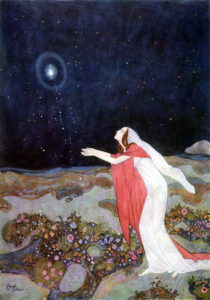The blossoming of Shakti
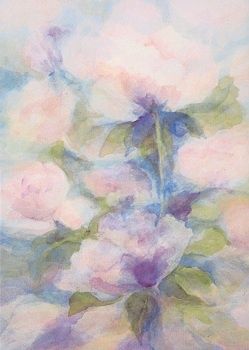
“The deepest heart, the innermost essence of religion, apart from its outer machinery of creed, cult, ceremony and symbol, is the search for God and the finding of God. Its aspiration is to discover the Infinite, the Absolute, the One, the Divine, who is all these things and yet no abstraction but a Being.”
Sri Aurobindo

A Vision
The Blossoming of Shakti is the vision of an authentic common life in the search for God as the first and highest priority. It is the vision of deep spirituality in silence, retreat and connectedness. It is the vision of a spirituality that does not exclude aliveness and self-expression, but seeks to lift life to a new level of wholeness through being nourished from the deepest source. It is the vision of a spirituality beyond dogmas, laws or a moral corset, but the trust in a healthy self-movement of the soul as it reconnects with its own innermost ground.
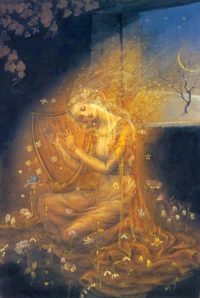
Contemplation as a gateway
Contemplation, retreat and silence are not the goal and end point of the spiritual path, but its gateway. Only when we have enough distance from the noise, busyness, worries and countless activities of everyday life, can the mind come to rest and explore the deeper layers of its own being. In this, our life sorts itself out and heals our inner being, and we can dive deeper and deeper into the mystery of the divine reality. The more stable and powerful this connection to our centre of being grows, the less we are dependent on withdrawal and silence, and our innermost workings can express themselves even in the noisy fullness of the world.
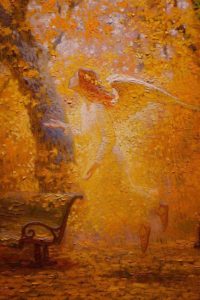
A profound philosophical basis
Healthy, deep and flowing spirituality must not fall prey to stony dogmas that impose an apparent truth on the individual. This would destroy the natural flow of one’s own experience and exploration. However, healthy spirituality must also not lose itself in the disorientation of a postmodern arbitrariness in which fragments from countless traditions are put together at random and which eventually become more labyrinth than guide. Only a strong philosophical foundation, based on deep spiritual insight, gives us support and orientation even in difficult or uncertain passages, keeps us from going astray and always leads us back to deep trust in the sure guidance of the Most High. In The Blossoming of Shakti we drew on the philosophy of the Indian spiritual teacher Sri Aurobindo [1878-1950] and his French companion Mirra Alfassa. In their comprehensive synthesis, they describe an approach that combines the full depth of Indian spirituality with a life-affirming vision. Sri Aurobindo’s poetic epic ‘Savitri’, moreover, gives us a rich wealth of colourful and profound images that help us to connect more deeply with the divine.

An unhewn path
What we are looking for is something old and something new at the same time. It is something old because we want to take up and carry on the heritage of millennia. We want to follow the path of all those people who, over all the millennia and cultures, have escaped the turmoil of superficial life and have devoted themselves entirely to the search for this divine mystery in monasteries, ashrams or hermitages, sitting, wandering, begging or following their own paths.
At the same time, it is something new, because we live in a new time, with different knowledge backgrounds, new moral concepts, an as yet unknown bringing together of knowledge from the most diverse cultures. And in all of this, we believe that there must be a new formulation and a new way of living of the old, which has yet to be found and developed in its new form and aesthetics. This is exciting – and challenging. It needs people who are willing to engage wholeheartedly in this adventure – sustained only by the trust that it is the ‘great Mother’ herself who can and will carry this new attempt and who will guide us on this pilgrimage.

The Plan
The Blossoming of Shakti is still a vision or only in its early stages. The vision is to bring together people who feel a sense of unity in their longing for God and their desire to live a life of stillness and subtlety. The vision is to create community that feels deeply nurturing, respectful and intimate. The vision is to find a framework of spiritual practice that brings us into daily new contact with the mystery of the divine presence, so that this contact can increasingly permeate all our lives. The vision is that a living community will emerge in Freiburg, that we will build a large online network so that we can take many people into this field of deep prayer, and that there will eventually be a centre in the country where a community can live together in deep contemplation and host guests for short or long periods of time. The vision is to make deep spiritual practice and a spiritual life credible and liveable for the modern world.
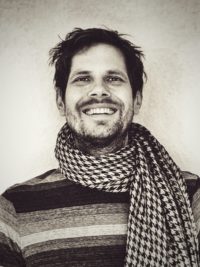
About me
My name is Sebastian. In my outer life I live in Freiburg and run a psychotherapeutic practice with a focus on Deep Psychology, Gestalt Therapy, Focusing and High Sensitivity. In my inner life, nothing moves me as much as the search for God, and since early adulthood I have spent most of the time I could free from work and study in Christian monasteries, Buddhist retreats or self-created hermitages. The encounter with Sri Aurobindo’s work touched me deeply in my late twenties, as I finally felt I was getting whole and coherent answers to my deepest questions. It was also the desire for a deeper encounter with him that led me to India for a year and a half after living with him in a Buddhist retreat house in the Black Forest. Since I returned from there in 2019, I have been centrally moved by the question of how we can continue the precious heritage that the ancient traditions have left us here in Europe and in Asia in a contemporary, integrative and yet profound form.
